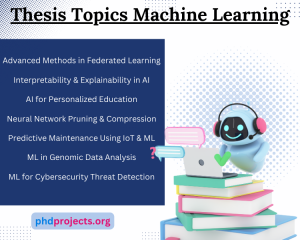Thesis Topics Machine Learning
Selecting a thesis title in machine learning (ML) is a process with recent research directions, accessible data, executional resources, private interests and public requirements. A range of thesis topics in machine learning is provided below. Please keep in contact with us as we are committed to assisting you further in your academic journey. Our expertise extends to covering any machine learning topic. We offer guidance in selecting a suitable topic, crafting a research proposal, and developing a project based on it. The following are a few current thesis topics in ML that we discover.
- Advanced Methods in Federated Learning:
- To enhance performance we study optimizing federated learning techniques.
- Interpretability & Explainability in AI:
- In high-stakes areas such as healthcare and finance we design approaches to improve the understandability of difficult frameworks.
- AI for Personalized Education:
- For developing adaptive learning mechanisms which alter content to each student’s requirements and learning styles the ML models are beneficial to us.
- Neural Network Pruning & Compression:
- We create frameworks in decreasing the size and executional needs of deep learning (DL) models without sacrificing efficiency.
- Predictive Maintenance Using IoT & ML:
- To detect apparatus breakdowns in business settings we combine IoT data with ML structures.
- ML in Genomic Data Analysis:
- To determine genomic data for understanding into genetic diseases and potential treatment we construct methods.
- Reinforcement Learning (RL) for Autonomous Systems:
- We discover new RL ideas for the growth of autonomous vehicles and other robotics applications.
- ML for Cybersecurity Threat Detection:
- To detect, find and prevent cyber-threats we do creations by ML in real-time.
- DL for Natural Disaster forecasting and Response:
- By utilizing neural networks we consider figures in data which detect natural disasters and optimize responsive ideas for post-disaster.
- AI-Enhanced Biometric Systems:
- We build more accurate and safe biometric investigation mechanisms by ML.
- Natural Language Processing (NLP) for Sentiment Analysis:
- For predicting sentiment and feelings in text data we implement the latest architectures throughout different languages and contexts.
- ML approaches to Combat Fake News:
- To forecast and point-out misinformation we are innovating techniques on social media and news outlets.
- ML for Energy Consumption Optimization:
- By deploying ML we optimize energy usage in buildings, smart grids, and other systems.
- AI for Drug Discovery & Molecular Simulation:
- We manipulate ML to speed up the process of drug discovery and the visualization of molecular dynamics.
- ML for Space Exploration & Astronomical Data Analysis:
- Our project applies ML to execute and understand data from space targets and astronomical analytics we utilize ML models.
- Deep Fakes & Media Authenticity:
- For predicting deep fakes and making sure of the protection of digital media we design ML frameworks.
- Human Activity Recognition Using Sensor Data:
- Analyzing data from accessories and surrounding sensors for healthcare and fitness applications ML techniques assist us.
- ML for Smart City Applications:
- We incorporate ML to improve several things of smart city starters, involving traffic handling, trash removal and societal security.
- ML in Agriculture for Crop Optimization:
- To forecast crop production, predict pests and offer insights into optimal farming experience we use AI algorithms.
- Time-Series Forecasting in Finance:
- For high accuracy financial detection and risk management we employ advanced ML approaches.
The above mentioned titles discuss a combination of theoretical and practical research that is adjusted to the particular scope of a Master’s thesis or a Ph.D. essay. This offers chances to multifaceted research, connecting ML with other domains such as healthcare, finance, ecological science and engineering. When selecting a topic we examine the feasibility of finishing our research within the duration and resources given for us and check whether the topic coincides with our professional goals and passion.

MPhil Thesis Topics in Machine Learning
MPhil Thesis Topics in Machine Learning can be effectively addressed with the assistance of phdprojects.org service. By seeking help from our qualified expert in ML field, we navigate you through the process successfully. Our team of writers offers full support to all clients with their writing requirements, delivering high-quality work in various areas of Machine Learning.
- A Performance Comparison Of Spectrum Sensing Exploiting Machine Learning Algorithms
- Comparison of Classical Machine Learning & Deep Learning to Characterise Fibrosis & Inflammation Using Quantitative MRI
- Using Supervised Machine Learning to Detect High-Skill Mutual Fund Managers
- Machine Learning Training on a Real Processing-in-Memory System
- Quantum Machine Learning for Network Intrusion Detection Systems, a Systematic Literature Review
- Machine Learning-based Detection of In-Utero Fetal Presentation from Non-Invasive Fetal ECG
- A Framework for Extrusion Detection Using Machine Learning
- Terrain Modeling Using Machine Learning Methods
- Automated Assessment of Lymphocytes Using Machine Learning Techniques
- Cubic spline as an alternative to methods of machine learning
- Predicting the Silent Data Error Prone Devices Using Machine Learning
- Application of different machine learning techniques in identifying features of protein sequence data
- Uneven and Irregular Surface Condition Prediction from Human Walking Data using both Centralized and Decentralized Machine Learning Approaches
- Using Machine Learning for Material Detection with Capacitive Proximity Sensors
- Identification of Anxiety and Depression Using DASS-21 Questionnaire and Machine Learning
- Machine Learning based Floor-level Sensor Positioning in Smart Buildings
- The application of interpretable machine learning model based on comparative learning and NARMAX in epidemic research
- AutoML – Learning, Understanding and Applying Machine Learning to Datasets
- IoT Botnet Creation and Detection using Machine Learning
- Comparative Question Answering System based on Natural Language Processing and Machine Learning